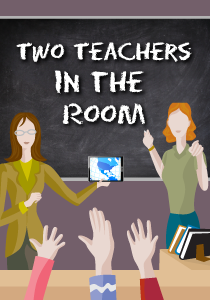The Power of Gratitude to Improve Co-teaching
A MiddleWeb Blog
 It’s Thanksgiving time here, and it is very likely that many folks are taking the time to stop and consider the reasons they have to be thankful.
It’s Thanksgiving time here, and it is very likely that many folks are taking the time to stop and consider the reasons they have to be thankful.
In fact, this holiday time sparked me to dig back into the Two Teachers archives and find this thankful co-teaching post that still resonates so true today.
I am also sparked to take this whole thankfulness thing a few steps further, not only for co-teaching in general but also because it also happens to be the 40th anniversary of the Individuals with Disabilities Act (IDEA). [Update: the 48th anniversary]
Thankfulness Research for the Classroom
I recently came across this research study by Emmons and McCullough (2003) that I, not surprisingly, connected to co-teaching. The study, entitled “Counting Blessing Versus Burdens: An Experimental Investigation of Gratitude and Subjective Well-Being in Daily Life,” captures some great ideas that can easily applied to co-teaching.

I won’t keep you in suspense. The group assigned to keep a gratitude journal showed greater increases in determination, enthusiasm, attention, and motivation compared to the other groups.
No surprise, right? But there’s more to think about here…
The results show more than just the benefits of gratitude – they also show that acknowledging that you are better off than others is not gratitude. To reap the benefits of true gratitude, we have to acknowledge why we may be better off and be grateful for the circumstances that brought about our favorable situation.
And here’s more evidence from a recent Huffington’s Post article, “What a Grateful Brain Looks Like.” University research in California suggests gratitude is related to morality and connecting with others – and understanding their perspectives. Gratitude goes beyond just thinking about rewards we may have received: it’s about what we can do for others.
Now there’s a perfect segue to glide to the next level of this post…how can co-teachers connect this research to their own practice?
Co-Teachers, Get Thankful!
- Take time to see a situation or a lesson through the eyes of your co-teacher. Make sure that this perspective viewing exercise results in stretching your own perspective. You will be surprised (and grateful) when you see how amazing the view can be when you see a situation or lesson from another angle!
See co-teaching as a mission to co-create positive learning environments with one another AND with your students. Take time to listen to what everyone in the room thinks (and be grateful for multiple perspectives).
- And here’s an obvious idea – keep a gratitude co-teaching journal (I know, I know, sounds sappy, but why not?!) Carve out a manageable amount of time – even if it’s once month or once every three months – to just find a few moments to focus on only one or two positive things about your current co-teaching situation. Make sure to embrace an awareness of your co-teacher’s perspective and the view of your students. Dig deep if you have to – always a positive.
- Ask yourself these questions: Would I be grateful to co-teach with me? And Would I be thankful I am a student in my classroom? The next step is a critical one: answer those questions and then act upon your responses. When you’re honest with those responses – you will either have a cause to celebrate or a reason to apologize and then step up – because the students in your classroom need both teachers in your room.
Gratitude for Increasing Awareness and Actions

In fact, teachers have the powerful choice to ditch the deficit model – it’s that simple. Here’s a less than five-minute video clip to empower viewers to shift from a deficit model mindset to a resiliency way of thinking. Do it for the kids!
Take a minute to just reflect on how far we’ve come as we all advocate for all students. Special education continues to make such powerful steps toward guiding positive outcomes for all learners. Neuroscience research and Universal Design for Learning (UDL) reminds us that all learners are variable learners. Teachers cannot just plan for the mythical average learner and hope for the best. The average learner just doesn’t exist. THAT is the great idea embedded in IDEA.
Great waves of actions are happening to ensure that students with disabilities are a part of this variability. They are educated alongside their peers in their least restrictive environment. Individuality is embraced. Diversity is seen as a natural way of life. Our daily instructional decisions and the culture of learning we co-create in our classrooms become a part of the big picture to increase awareness of the abilities of all learners – in all schools.
Our daily classroom decisions make us a part of adding to this legacy of the Individuals with Disabilities Act (IDEA). We all have the opportunity to make a difference everyday. What does IDEA mean to you?
Let’s get a conversation going….


 See co-teaching as a mission to co-create positive learning environments with one another AND with your students. Take time to listen to what everyone in the room thinks (and be grateful for multiple perspectives).
See co-teaching as a mission to co-create positive learning environments with one another AND with your students. Take time to listen to what everyone in the room thinks (and be grateful for multiple perspectives).


































This is a profound article with a direct and powerful message. One cannot teach to the mythical and probably non-existent average student. We need to ditch the deficits teaching mindset and incorporate a “resiliency” strategy for approaching the education of our children. Congratulations Mrs. Stein for presenting these pointed strategies so directly and in straight forward language. Keep up the important work!
Best regards,
Lou Brill
Hello, Mr. Brill!
I must say, it feels quite satisfying to respond to you on a post with the topic of gratitude! As one of my first and most powerful mentors–I say thank YOU! You sparked and focused me all those years ago…and you continue to be a part of the work I do today…and always!
All the best!
Elizabeth